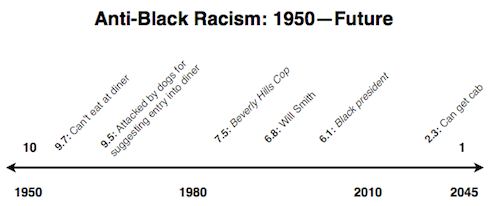A new survey finds that white Americans A) love to take surveys as long as Wheel of Fortune isn’t on or about to be on and B) believe that anti-white racism is now a more serious problem in the United States than racism against blacks. By contrast, African-Americans—who are more likely to actually know some black people—reported that racial persecution is still, you know, the one thing in society that white people do not get to have more of. None of this is surprising—you can tell because it’s extremely depressing. Using the same powerful sense of victimhood that made 1968 the most important summer in American history, white people have taken a hard look at anti-black racism and decided that, since the 1950s, it has declined by two thirds. Over the same time, anti-white racism has nearly tripled. This is why you must never ask white people their opinion.
Such precise calculations are available because of the genius methodology of this particular survey, which asked 209 white and 208 black*![]() respondents to rate each decade’s level of racism on a scale of 1 to 10. According to black respondents, anti-black bias started at around 9.7 in the 1950s and declined to 6.1 by the end of the last decade. White people saw an even steeper decline in anti-black prejudice, which they put at 9.1 in 1950 and a scant 3.6 in the 2000s. For those of you who wonder what a one-to-ten scale of anti-black racism looks like, I’ve gone ahead and whipped one up:
respondents to rate each decade’s level of racism on a scale of 1 to 10. According to black respondents, anti-black bias started at around 9.7 in the 1950s and declined to 6.1 by the end of the last decade. White people saw an even steeper decline in anti-black prejudice, which they put at 9.1 in 1950 and a scant 3.6 in the 2000s. For those of you who wonder what a one-to-ten scale of anti-black racism looks like, I’ve gone ahead and whipped one up:
By comparison, whites perceived an increase in anti-white racism from 1.8 to 4.7 over the same period, as measured on the scale of anti-white racism:
Interestingly, white people estimated the current level of anti-black prejudice at 3.6—exactly twice the level of anti-white prejudice in the 1950s; meanwhile, their current estimated level of anti-white prejudice, 4.7, is just over half of where they put anti-black racism during the Jim Crow era. According to white people, they now have it half as bad as Medgar Evers, whereas black people now enjoy half the advantage of Orval Faubus. You can tell because they keep threatening to deploy the national guard in order to prevent white people from attending state universities, but they can’t actually do it.
The sheer absurdity of assigning a numerical value to racism is exceeded only by the absurdity of calling up random people and pretending that their estimation of same is a kind of information. I’m going to take a flyer here and say that white people are not the greater victims of racial prejudice in contemporary America. The problem is, I can’t prove it. Racism is an almost entirely un-quantifiable phenomenon, since A) it can be perceived without being intended and B) its main purveyor is usually some sort of institutional authority.
Item (B) accounts for the massive discrepancy in perceived levels of racism among blacks and whites. Back in the 1950s, the official position of institutional society was that racism was a thing of the past, as evidenced by the fact that white people could no longer legally own the black people not allowed to use their drinking fountains. Now, in the 2010s, the official position of institutional society is that racism is a thing of the past, as evidenced by the presence of one member of each race—black, white, Asian, Latindiandicapped—in all public service announcements.
In both historical cases, the official account deviates obviously from daily experience. Recognizing the essential dishonesty of institutions was a crucial aspect in the history of getting white people to realize how badly black people were/are screwed, but it has also made it possible for white people to read prejudice into any institutional change—particularly any that ameliorate the prejudice against blacks. The modern white person knows that “separate but equal” was a legal technicality that did not jibe with reality. The problem is that the same decentering of authority now allows whites to claim that affirmative action or the country’s first black president are signs of institutional racism.
Our governments, schools and media have a racial credibility problem. They picked it up back in the 1950s, when southern sheriffs could never figure out why Martin Luther King’s house exploded and guys like George Wallace were constantly appearing on television to talk about how not racist they were. Back then, insanely racist policies were routinely presented as innocuous, even progressive. Recognizing them as racist was such an important historical development that it has since enabled white people to treat genuinely innocuous, progressive programs as expressions of institutional racism.
Here’s how you know white people are wrong about being bigger victims of contemporary racism than black people: if the survey addressed a representative sample of the American population, it only would consulted 54 black people. That’s 13% of the US population, compared with 72% white people. It’s possible that one eighth of the population is oppressing three-quarters of the population, but that would be really impressive. To find a historical precedent for something like that, you’d probably have to look at, um, white people.







“Now, in the 2010s, the official position of institutional society is that racism is a thing of the past, as evidenced by the presence of one member of each race—black, white, Asian, Latindiandicapped—in all public service announcements.”
Whereas we knew racism was a thing of the past in the 90s because each of the above races was present in Captain Planet’s Planeteers and in the BK Kids’ Club.